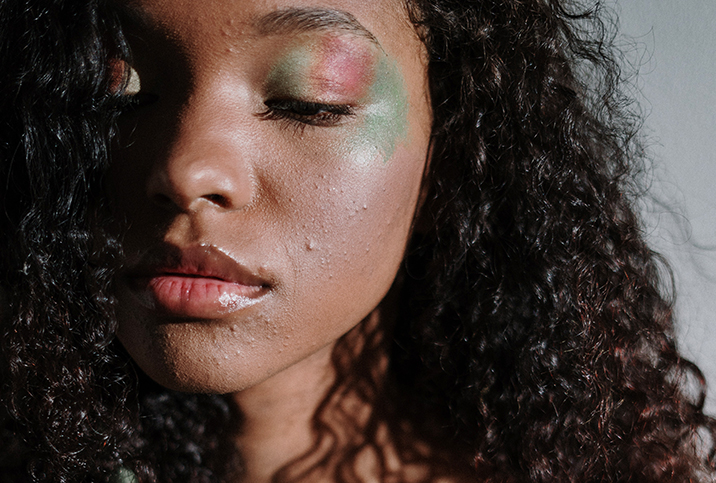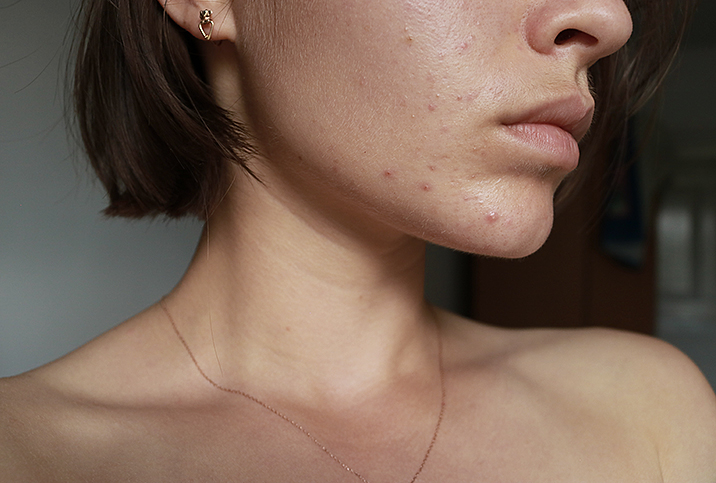Help, My Birth Control Gave Me Acne

If you’ve ever taken a good look at that unassuming little instruction manual stuck to the back of your monthly birth control packet, you know the unmatched convenience and protection of hormonal contraceptives also come with pages of warnings about potential side effects and ailments. While many of these common reactions, such as nausea and mood changes, aren’t visible to the naked eye, acne and other external symptoms can put a huge damper on your confidence and social life.
Oral combination pills (OCPs), one of the most popular forms of hormonal contraception, contain both estrogen and progesterone. The good news is these pills can work to decrease acne by increasing sex hormone-binding globulin (SHBG), a glycoprotein that then grabs onto and decreases free-floating testosterone in the bloodstream, according to Mikaela Rush, M.D., an OB-GYN based in Cedar Park, Texas.
This free-floating testosterone belongs to a set of hormones called androgens, all of which play some role in developing male traits and reproductive activity, but are also responsible for healthy organ function in females. Through using OCPs to reduce androgen levels, you may notice an improvement in the appearance of acne due to the decrease in your body’s production of sebum (aka that pore-clogging, oily residue that builds up on your face, creating the perfect environment for even more pesky pimples).
Birth control is primarily helpful for those with any acne breakouts tied to hormone changes, said Kaveri Karhade, M.D., a board-certified dermatologist in San Francisco. “This might be you if your acne flares around menses, if you have acne on the chin or jawline or if you've been diagnosed with a condition such as PCOS” (Polycystic ovary syndrome).
So why does birth control cause acne for you but clear it up for your friend? It may have to do with what type of hormonal contraceptive you’ve opted for.
While hormonal birth control is frequently prescribed to help remedy stubborn acne, some users, even those who were not previously acne-prone, may experience a temporary acne flare-up as the body reacts and adjusts to the addition of the new hormones, Rush explained.
Progestin-only birth control methods such as the hormonal IUD, depot injection or subdermal implant may even contribute to a heightened severity of acne, according to a 2016 study published in the Journal of Drugs in Dermatology. And some progestins, including norgestrel or levonorgestrel, are theorized to be more androgenic, meaning. they may actually stimulate more sebum production—Rush explained.
If an increase in acne is turning you off from your hormonal birth control method, your dermatologist or OB-GYN can offer a few solutions to keep you protected and your skin clear.
While hormonal birth control is frequently prescribed to help remedy stubborn acne, some users, even those who were not previously acne-prone, may experience a temporary acne flare-up as the body reacts and adjusts to the addition of the new hormones.
“We recommend topical treatments first,” Rush said. “Otherwise, we recommend switching to another birth control, specifically the ones the FDA has approved for acne if they haven’t already been tried.” There are several OCPs, such as Ortho Tri-Cyclen, Estrostep and Yaz, that are approved by the FDA specifically to fight acne.
While birth control does help clear up some people’s skin, there isn’t exactly a magic pill to get rid of acne (yet). Even if your dermatologist prescribes you a combination-type birth control, there’s a good chance you won’t see the elimination of your breakouts.
“True androgen suppression requires higher doses of estrogen than what is found in the birth control pill, which is why birth control alone is sometimes not enough for someone with hormonal acne,” Karhade said. That means you might see your pre-existing acne stick around even after starting birth control.
Once you start a new hormonal birth control, give yourself a couple-months trial period to make sure you’re not jumping the gun over temporary side effects. If your skin still hasn’t cleared up, it might be time to opt for a new method because you shouldn’t have to decide between clear skin and safe sex.


















